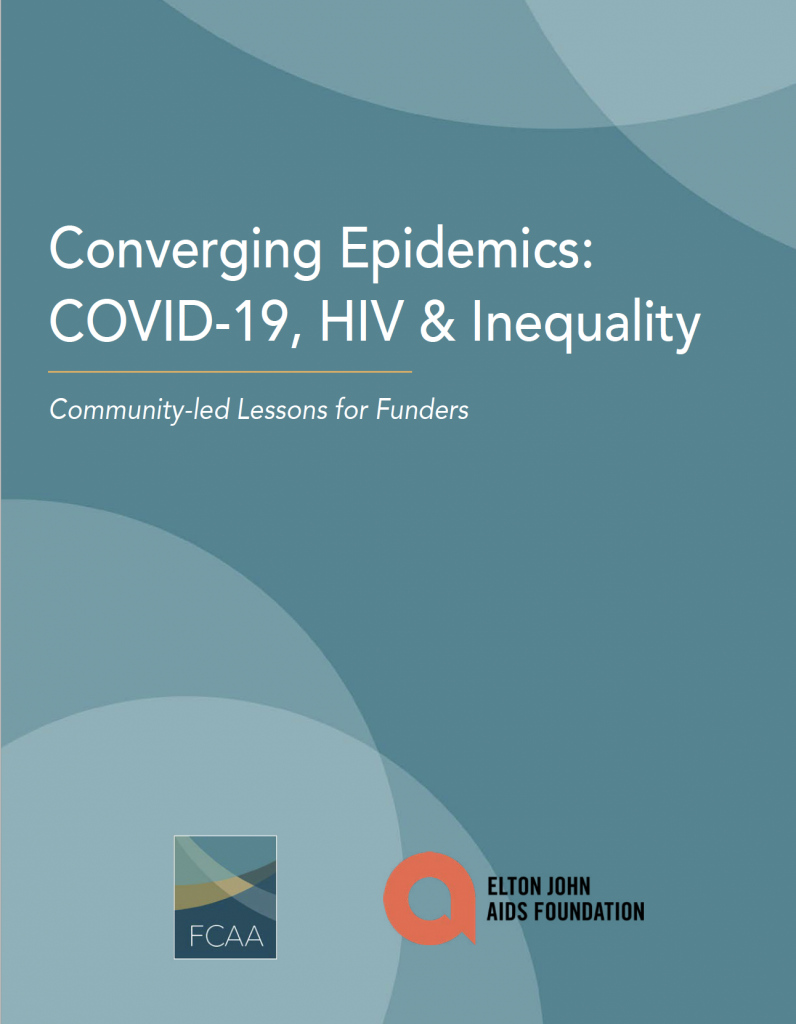Converging Epidemics: COVID-19, HIV & Inequality
Community-led Lessons for Funders
This report —commissioned by FCAA in partnership with the Elton John AIDS Foundation (EJAF)—highlights:
- How marginalized communities have been impacted by COVID-19 in the U.S. and globally, and what their key evolving needs have been as the pandemic has progressed;
- Examples of community-led innovations, adaptations and bright spots (see below);
- Lessons learned from private funders’ emergency COVID-19 responses; and
- Recommendations for funders, global health institutions, and governments—including the new U.S. administration—to guide their efforts going forward.
learn more
- Read the full report.
- Download the executive summary
- Share the report with this social media toolkit
- Read about examples of community resiliency, flexibility, and creativity during the pandemic as highlighted in a series of case studies and a list of other U.S. and global bright spots.
- Read the new accompanying report: Making the Case for Greater Investment in Community-Rooted Funders
- Watch the launch webinar recording (below).
Case Studies
Read about examples of community resiliency, flexibility, and creativity during the pandemic as highlighted in a series of case studies.
Global Snapshot
-
- The “One Egg a Day” crowdfunding initiative, started by an organization of people who use drugs in Vietnam, raised support for food, clothes, and cash for hundreds of affected families.
- Using informal crowd-funding initiatives, sex workers in Australia, Thailand, Ukraine, and many other locations raised funds to provide accommodations for sex workers who were evicted for defaulting on their rent.
- In Durban, South Africa, a new harm-reduction center offering clean needles and other services was established through an innovative, first-ever public-private collaboration.
- In Barcelona, Spain, a harm-reduction organization extended the hours of operation for its drop-in center, resulting in a higher number of women and gender non-conforming people accessing the facilities; provided an expanded range of services to meet the needs of clients, including support initiatives for self-healing, bonding, wisdom sharing, self-defense, and solidarity; and enabled clients to access a new shelter with a safe consumption site, run by the municipality and another NGO.
- In India, activists creatively secured essential service permits and started delivering ARVs on motorbikes in hard-to-reach areas. This helped to prevent ARV disruptions at a time when many PLWH could not attend ARV clinics due to lockdowns and travel restrictions that made it impossible to use public transport.
- Virtual rapid clinic surveys were conducted in Nepal to influence health access advocacy needs for PLWH.
- Harm reduction groups in China mobilized to transport methadone across the border for use in Myanmar.
- MSF set up outdoor gazebos at existing primary clinics to enable quick and safe COVID-19 screening.
- An adaptation that didn’t work: The City of Cape Town created a forced isolation site for homeless people during the pandemic without consulting groups on the ground or public health specialists. The initiative was a colossal failure and has since closed.
U.S. Snapshot
- Harm reduction organizations in West Virginia, San Francisco, and Baltimore added community housing programs to their outreach and syringe exchange services.
- Harm reduction programs modified their drop-in services to outdoor spaces.
- CBOs that provided case management services added food pantries and food delivery programs.
- To help people reentering the community due to overcrowding in jails, a Chicago corrections program modified its services to provide technology devices and training.
- A CBO in Selma, Alabama, started a community garden to help people obtain fresh produce.
- A CBO in Memphis, Tennessee, pivoted to create sex worker safety kits.
- The COMPASS Initiative Break Room created a weekly virtual hangout space to increase connections and decrease stigma in the U.S. South.
- The Coalition for Rights and Safety for People in the Sex Trade in Seattle achieved a breakthrough in long-standing advocacy to revoke a “loitering order” that criminalized sex workers amid COVID-19.
- Two intersectional organizations focusing on transgender people of color harnessed the COVID crisis and Black Lives Matter movement to significantly increase support for housing initiatives:
- Glitz raised $1 million to buy an apartment for the unhoused, including people released from Rikers Island, and No Justice No Pride raised money from individual donors for needed housing.
